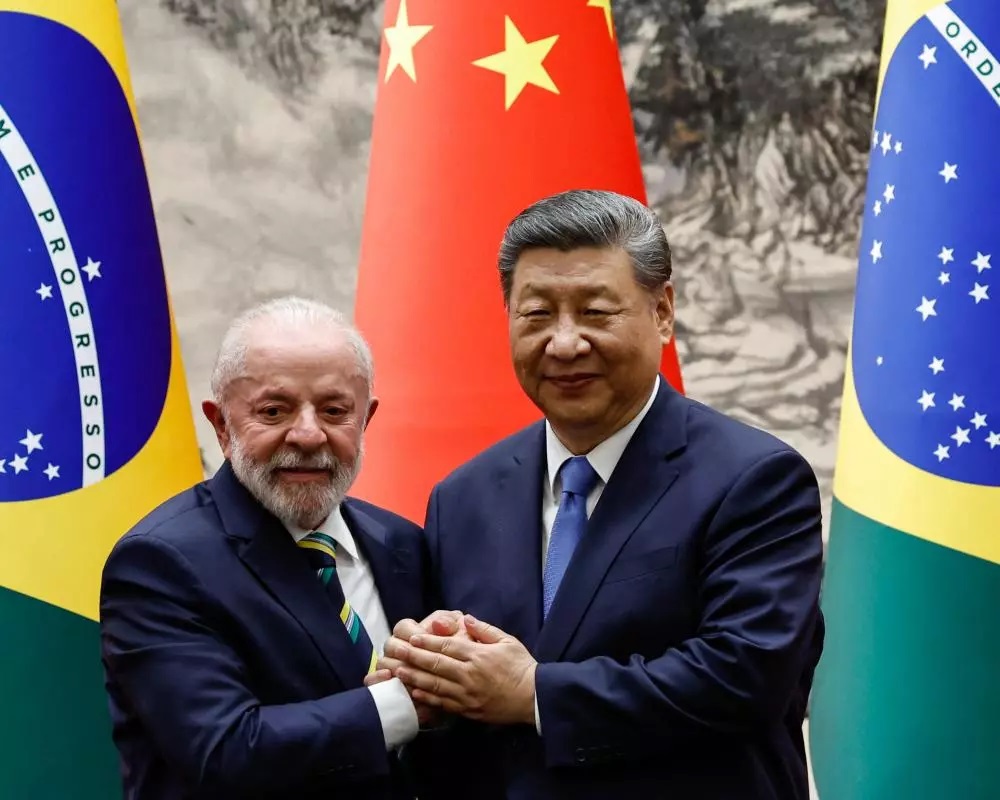Brazil appears to have seized an opportunity with the ongoing trade war between Trump’s US and China, to forge stronger economic ties with China.
Brazilian President Luiz Inácio Lula da Silva became one of the few world leaders to receive a hug from Chinese President Xi Jinping,, according to online media reports.
This gesture, analysts say, reflects the strengthening ties between Brazil and China.
During Lula’s recent visit to Beijing, the two leaders shared a warm embrace.
This followed a handshake after Lula’s speech at the China-CELAC Forum, a dialogue between China and Latin American and Caribbean countries.
In his address, Lula criticized U.S. tariffs and advocated for a “multipolar order” where the Global South is adequately represented.
This rhetoric aligns with China’s stance against the protectionist policies of former U.S. President Donald Trump.
Lula’s participation in the forum, alongside the presidents of Chile and Colombia, was strategically significant for China.
It supposedly aimed to engage with influential Latin American leaders rather than those traditionally aligned with Beijing.
Lula received a grand welcome in Beijing, including a military performance in Tiananmen Square and a 21-gun salute.
During the forum, President Xi emphasized China’s shared values with the Global South, stating, “Independence and autonomy are our glorious tradition.
Development and revitalization are our inherent right.”
He further expressed that China and the Latin American and Caribbean community have a “shared future.”
Trade relations between Brazil and China have flourished, with bilateral trade reaching a record $157.5 billion in 2023.
Brazil now supplies over 70% of China’s soybeans.
Also, Chinese companies have committed to significant investments in Brazilian agriculture and infrastructure.
For instance, Luckin Coffee, China’s largest coffee chain, has pledged to purchase 240,000 tonnes of Brazilian coffee beans over five years, valued at $1.38 billion.
In Beijing, Lula declared, “If it’s up to my government, our relationship with China will be indestructible.”
His statement highlighted the deepening economic and strategic partnership between the two nations.
The visit culminated in the signing of 20 agreements covering agriculture, mining, nuclear energy, and currency swaps, alongside a $4.5 billion investment pledge from China.
The current trade tensions between the U.S. and China have presented Brazil with opportunities to bolster its exports to China, particularly in agriculture.
This is despite Brazil’s strong ties with the U.S.
Victoria Chonn-Ching of the Atlantic Council noted that the U.S.-China trade war has created export opportunities for Brazil.
According to him, this is especially in the agricultural sector.
Ideologically, Brazil and China share common ground, both advocating for multilateralism and a multipolar world order.
While Brazil has not joined China’s Belt and Road Initiative, Lula emphasized that Latin America “does not want to be the stage of hegemonic disputes.”
He thus underscored Brazil’s desire to maintain autonomy in its foreign policy.
Recent global events have further aligned Brazil and China.
Following the October 7 attacks in Israel, Brazil, as president of the UN Security Council, drafted a resolution condemning Hamas and calling for a humanitarian pause in hostilities.
China, which had not previously condemned the attacks, voted in favor of the resolution after diplomatic discussions with Brazil.
Although the resolution ultimately failed due to a U.S. veto, the collaboration between Brazil and China highlighted their shared commitment to global peace and stability.
Additionally, both countries have issued joint statements on the war in Ukraine, advocating for peaceful resolutions without condemning Russia’s actions.
On his return journey from China, Lula’s plane made a stop in Moscow.
There, he spoke with Russian President Vladimir Putin, further demonstrating the strengthening ties between Brazil, China, and Russia.
In summary, President Lula’s visit to Beijing marks a significant step in the deepening relationship between Brazil and China.
It is characterized by mutual economic interests, shared ideological values, and collaborative efforts on global issues.
This partnership positions Brazil as a pivotal player in the evolving dynamics of the Global South and the broader international community.







